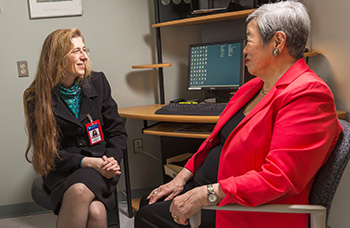 Lisa Freed, MD, with a patient in YNHH's Women's Heart and Vascular Program, which targets prevention, diagnosis and treatment to women who have or are at risk for cardiovascular disease. The program is available in North Haven, Orange and Guilford, with a new clinic being established with partners in Greenwich.
Lisa Freed, MD, with a patient in YNHH's Women's Heart and Vascular Program, which targets prevention, diagnosis and treatment to women who have or are at risk for cardiovascular disease. The program is available in North Haven, Orange and Guilford, with a new clinic being established with partners in Greenwich.
Every three years since 1997, the American Heart Association has conducted a nationwide survey to determine awareness of the risk for heart disease among women.
While awareness has increased since the first survey, 2012 results (the latest available) show that 44 percent of women don't know that heart disease is the leading cause of death among women. Awareness is even lower among African-American and Hispanic women.
When she talks about Yale New Haven Hospital's Women's Heart and Vascular Program, cardiologist and Program Director Lisa Freed, MD, emphasizes these survey results. She also cites another nationwide survey showing that less than half of physicians rated heart disease as their top concern for female patients.
"That's why programs like this are so important," Dr. Freed said. "Cardiovascular disease is the number one killer of women and men, but prevention and treatment for women can differ." Dr. Freed treats both genders, but began specializing in women's cardiovascular health in 1999. The physician practice she belonged to became part of Yale Medical Group and YNHH, and the Women's Heart and Vascular Program officially opened in 2013. The program provides testing and treatment specifically for women who have or are at risk of heart disease. It starts with Stefania Levesque, RN, who completes a lengthy questionnaire with patients.
"One of the things we do best is listen," Dr. Freed said. "In addition to cardiovascular issues, we ask about depression, anxiety, sleep habits, hormonal status and many other factors."
Because other medical conditions can be tied to cardiovascular health, Dr. Freed collaborates with a variety of physician specialists and a team that includes a nutritionist, exercise physiologist, social worker and smoking cessation experts.
Freed and the team are attuned to the sometimes subtle differences between men and women in cardiovascular disease risk factors, symptoms, diagnosis and treatment. Some risk factors, such as birth control pills and menopause, affect only women. Others affect women differently; for example, diabetes increases the risk of death from coronary heart disease more in women.
Men and women can have the same heart attack symptoms, such as chest pain, but women are more likely to have other symptoms, including discomfort in the back or jaw. Coronary disease treatment for men and women often involves the same medication regimen, but some studies show that women have a different response to it.
All of this inspires Dr. Freed to continue working to raise women's awareness and knowledge about cardiovascular disease.
"Women have to be proactive," she said. "I try to empower them to take care of themselves, be sure their risk factors are under control and make sure they're receiving the care they need."
